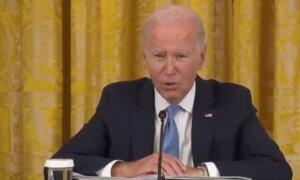The two sets of competing jury instructions to be drafted will now allow for both prosecutor and defense scenarios.
The judge in former president Donald Trump’s classified documents case has ordered the preparation of jury instructions in a way that holds the door wide open to a potential dismissal of the case, on the premise that President Trump designated the documents he kept at his Mar-a-Lago home as “personal records.”
U.S. District Court Judge Aileen Cannon issued an order on March 18 requiring President Trump’s attorneys and special counsel Jack Smith’s team each to prepare and file their respective preliminary jury instructions along with proposed verdict forms by April 2.
Specifically, she ordered the preparation of two separate drafts of the jury instructions—one based on a scenario where the jury can decide if prosecutors have proven that a given record retained by President Trump was either “presidential” or “personal,” and the second based on a scenario where they must accept that President Trump used executive powers to declassify the documents and categorize them as “personal.”
Under this scenario, President Trump’s possession of the documents was not “unauthorized,” as alleged in counts 1-32 of the indictment, and so the case should be dismissed.
Therefore, rather than “prematurely decide now” whether the PRA argument holds and the case should be dismissed, Judge Cannon said in the March 14 order that the question should be raised in the future “as appropriate in connection with jury-instruction briefing and/or other appropriate motions.”
Her March 18 order for the drafting of competing sets of jury instructions based on the two different scenarios makes clear that the PRA argument remains in play and could lead to the case being dismissed on that premise.
‘Personal’ Or ‘Presidential’?
Mr. Smith alleged in the indictment that it became a crime for President Trump to have classified documents the day he left office.
In court filings and during oral arguments on March 14, defense attorneys argued that the PRA differentiates between “presidential” and “personal” records at the president’s sole discretion, tasking the National Archives and Records Administration only with archival duties for presidential records that a president chooses to return.
The defense’s position is that by taking the documents from the White House, President Trump had designated these records as “personal.”
Prosecutors argued that President Trump never designated the records personal, that he did not have the ability to do so as a former president, and that even if he had, it would not shield him from prosecution.
The defense pointed to past presidents whose “personal” diary records contained information related to national security. They argued that if the Espionage Act makes it illegal to possess classified information, then it would be so even if the information were in the form of a diary entry.
They argued that it was instructive that past presidents were never prosecuted for diary records that contained national security records. For instance, former President Bill Clinton kept tape records containing military information, which he shared with a biographer. Former President Ronald Reagan’s diaries also contained classified information.
The defense team said that these records were both “personal” documents, and neither president faced charges from the Department of Justice (DOJ), while arguing that President Trump’s case breaks with past precedent in this regard.
Prosecutors said President Clinton’s tapes were not found to contain classified information but acknowledged that President Reagan didn’t face prosecution for his personal records, which did include classified information.
They brought up examples of other officials who faced prosecution for retaining classified information but could not supply examples when pressed by the judge for instances in which vice presidents or presidents faced prosecution over the retention of classified information.
The defense added that only a president has the authority to designate records personal—not NARA, the DOJ, or the court. They stressed they were not asking the court to make a determination that the records were personal because their position is that President Trump has already done so and that matter was not subject to judicial review.
With past presidents, NARA operated on an honor system, the defense argued. For example, the archive sent a letter to former President George W. Bush asking whether he had classified information or other documents to return. A spokesperson answered that they did not, and that was the end of the matter.
The defense argued that every president since George Washington has taken things from the White House and that Congress had passed the PRA giving presidents discretion to choose what documents to hand over to NARA for public record keeping in hopes that records could be archived.
Catherine Yang, Jacob Burg, and T.J. Muscaro contributed to this report.
Original News Source Link – Epoch Times
Running For Office? Conservative Campaign Consulting – Election Day Strategies!


